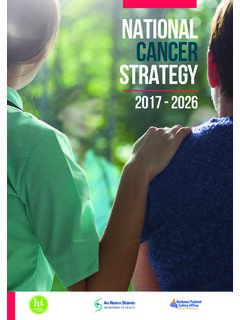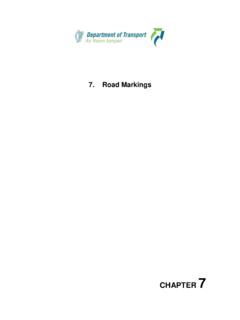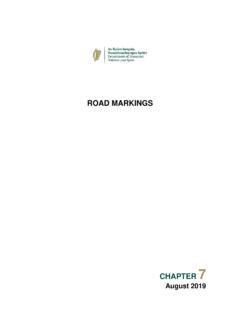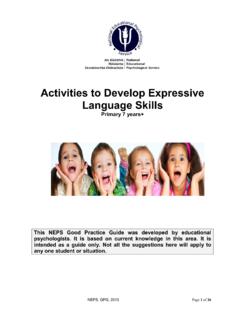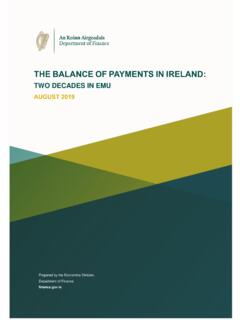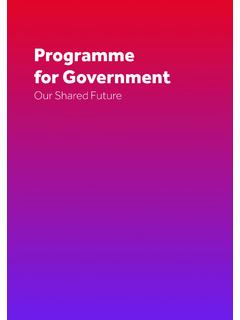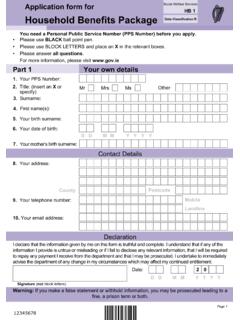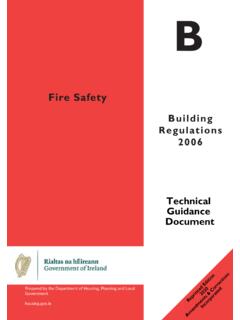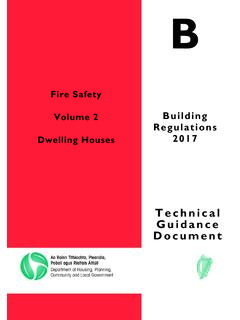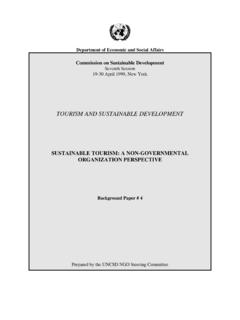Transcription of Tourism Recovery Plan
1 Tourism Recovery Plan 2020 - 2023. Prepared by the Tourism Recovery Taskforce October 2020. Tourism Recovery Taskforce 2. Tourism Recovery Taskforce Table of Contents Task Force Membership .. 4. Chairperson's Foreword .. 5. Executive Summary .. 7. 1. The Importance of Tourism in Ireland .. 13. 2. Consultation 15. 3. Supporting Business 16. 4. Enhancing Sustainable 19. 5. Re-establishing International 21. 6. Strengthening Marketing 24. 7. Increasing Investment in Tourism Product .. 26. 8. Promoting 28. 9. Building a Sustainable Tourism 31. 10. Overseeing Implementation of the 33. 11. 34. Appendix 1: Terms of Reference .. 35. Appendix 2: Membership of TRT Workstreams .. 36. Appendix 3: Consultation .. 39. Appendix 4: TRT June Statement .. 40. Appendix 5: Initial Report to Minister .. 41. 3. TASKFORCE MEMBERSHIP. Ruth Andrews (Chair) Eoghan Corry Martin Dalby CEO, ITOA and special advisor to AVEA Travel Industry commentator CEO, Center Parcs Tom Enright Elaina Fitzgerald Kane Niall Gibbons CEO, Wexford County Council Director, Fitzgerald's Woodlands House Hotel CEO, Tourism Ireland John Herlihy Stephen Kavanagh John Kelly VP, EMEA and LATAM, LinkedIn Non-executive Director Aer Lingus & CDB Aviation A/ Assistant Secretary for Tourism DTCAGSM.
2 Paul Kelly Eimear Killian John McLaughlin CEO, F ilte Ireland GM, Brassiere on the Corner & Blake's Bar, Galway CEO, North & West Coast Links Golf Ireland Secretariat: Maria Melia Principal Officer DTCAGSM. Colm O'Connor Assistant Principal DTCAGSM. Ken McMahon HEO DTCAGSM. Pat O'Leary Jane Stacey Lisa Herlihy Chair of Kerry Tourism Industry Federation Head of Tourism Unit, OECD EO - DTCAGSM. 4. Tourism Recovery Taskforce CHAIRPERSON'S FOREWORD. The impact of Covid-19 on Tourism has been existential, devastating employment, businesses and livelihoods across the sector . Tourism employs 260,000 people across Ireland and up to 180,000 of these jobs are either vulnerable or already lost. In 2019, the sector generated over 9 billion for the economy from international Tourism and related carrier receipts together with domestic Tourism .
3 Taking the necessary action now can save and restore jobs and income and avoid the need for long-term State intervention to support those left behind by the crisis. Many Governments are developing sector -specific responses given the way that this crisis has manifested itself, and Ireland must do so too. Tourism is the most important indigenous labour intensive sector and generates very substantial export earnings and tax revenues. It is woven into the fabric of Irish cultural and social life and is of critical importance to regional economies in particular. Because Tourism is so integrated into the economy and so diverse and overwhelmingly made up of SME's, it has suffered from a lack of visibility and recognition as an internationally traded service. Given the size of the sector , the crisis in Tourism is also greatly exacerbating Ireland's macroeconomic challenges, and will continue to do until the industry can recover.
4 Re-opening Tourism businesses and managing their Recovery in a way that is economically viable, safe and attractive for tourists and local communities will require coordination at a level not seen before. The roadmap to Recovery will require flexibility, agility, investment and innovation with a whole of Government commitment in strong collaboration with the industry. There are a number of issues and priorities in the short-term that require decisions in the context of the Budget, National Economic Plan and the Government's Living with Covid-19 Plan. These, we believe, are critical and require urgent measures to ensure the survival and sustainable Recovery of Tourism businesses and the supply chain to supports jobs across the economy. However, we must also not miss the opportunity to sow the seeds of our subsequent Recovery too, so a sustainable industry can grow from the current crisis.
5 Tourism is as integral to the national economic Recovery now as it was in the last recession. The sector is uniquely positioned to contribute strongly to job creation and reversing unemployment in communities and among the young throughout the country. This Recovery provides an opportunity to strengthen the industry and reaffirm the importance of the sector as an economic driver and export led industry. Tourism 's contribution is not confined to directly generated employment, economic activity and exports. The sector has an important multiplier effect on other employment sectors such as agriculture, transport, food and beverage and retail, and is particularly important to regional economies. It also contributes to Ireland's international attractiveness for FDI, supporting the reach of our cultural heritage and the arts, and promotes social inclusion and access to the labour market.
6 It has played a vital role in reshaping North/South relationships since the Good Friday Agreement through the joint marketing and promotion of the island of Ireland internationally. It has a proven track record in delivering strong Recovery following previous global economic shocks, creating the largest number of jobs post the 2009/2010 recession. The TRT Recovery Plan has been developed after an extensive consultation with the industry across the country. The TRT itself worked in eight separate workstreams, with the support of industry practitioners and experts, reflecting the breadth of the impact that this crisis has had on the sector . In addition, the TRT collected the views of stakeholders through a public consultation which attracted 813 responses, with separate submissions from over 60 organisations, a number of which presented directly to the Taskforce.
7 5. Tourism Recovery Taskforce The Taskforce wishes to acknowledge the work done by the Government to date in controlling the spread of the virus and protecting the health of the nation. It welcomes the Roadmap to Recovery and the Plan for Living with Covid-19. This Plan will require resilience and innovation. A whole-of-government approach and co-ordination across government, and with the industry, will be essential in the implementation of this Plan and the rebuilding of the Tourism sector . The Tourism industry stands ready to play its part and secure a sustainable Recovery for its long-term future. The resilience and ability of the Tourism industry and the people it sustains has been tried and tested in the past. Even in these incredibly difficult times, I and my colleagues on the Tourism Recovery Taskforce remain confident that the Irish Tourism industry can recover and develop as a world leader in sustainable Tourism practices.
8 The prize is huge; the industry can return to providing over one quarter of a million jobs, particularly in Ireland's regions and generating over 9 billion for the economy. However, to do this, the Government's active support is needed now. To conclude, I wish to express my sincere gratitude to the members of the Taskforce. The amount of effort and time invested in this process by each member over the past four months has been exemplary given the circumstances. Thanks also to the Secretariat for the huge amount of work and guidance provided to the Taskforce as well as to Indecon Economic Consultants for its valuable expert assistance and advice. Ruth Andrews, Chairperson 6. EXECUTIVE SUMMARY. Introduction The Tourism Recovery Taskforce (TRT) was established in May 2020 to develop a Recovery plan for the Tourism industry from 2020-2023 in recognition that this vital sector of the economy has been hardest hit by the Covid-19.
9 Pandemic. Covid-19 has had a devastating impact on employment and the viability of thousands of businesses. In setting out to develop a framework for Recovery over 2020-2023, the TRT has focused on how best the Irish Tourism sector can adapt and recover in the changed Tourism environment as a result of the Covid-19 crisis. This plan identifies priority aims, key enablers and market opportunities and outlines the most cost-effective measures to support the sector and deliver the best return on investment. In recognition of the ongoing uncertainties facing the industry, this plan maps a path to survival, sustainability and Recovery . Decisions made in the short-term survival phase will have a significant impact on Tourism 's longer-term prospects. Taking the right decisions to support survival in Q4 2020 and Q1 2021 will underpin the recommendations of the medium and longer term Recovery , thereby both assisting the sectors Recovery and strengthening it in the longer term.
10 The TRT Recovery Plan has been developed after an extensive consultation with the industry across the country. The TRT itself worked in eight separate workstreams, reflecting the breath of impact that this crisis has had on the sector . In addition, the TRT collected the views of stakeholders through a public consultation which attracted 813. responses, with separate submissions from over 60 organisations. The TRT strongly believes that with the right investment and support, particularly in the survival phase, Tourism can retain capacity, skills and strategic assets that will strengthen the pace of Recovery when restrictions are eased to enable international Tourism . Extending specific liquidity and wage support measures now is key, with a greater emphasis on businesses that have been most impacted and are vital to Tourism to ensure a sustainable Recovery .
